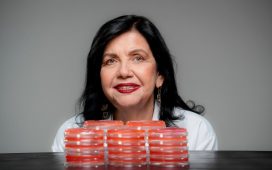The question I am writing to you from the edge of the abyss… Hello! Despite the privileges I’ve had, my life has been a constant struggle. Since I was four, I’ve had little joie de vivre, thanks to a stew of mental health issues, a difficult home life and a recent discovery that I’m on the autistic spectrum. I don’t blame my autism for everything – my personality would be difficult regardless – but it explains a lot.
My life runs in cycles: denial of my feelings, stoicism, breaking point, sabotage and starting over. As a child, I’d bottle up frustrations at school, only to explode at home. In adulthood, these meltdowns have been more dramatic: quitting jobs, a half-baked suicide attempt, tantrums and, my biggest regret, the Pixie Cut Year. I’ve navigated life like the Charge of the Light Brigade, with little to show for it. I’ve had a string of odd jobs, television (ended in legal dispute), the Royal Albert Hall (unrequited crush) and living in a caravan in Scotland, where my job was to play chess with an elderly gentleman. Most recently, I worked for a religious leader despite being irreligious. For all my supposed creativity, I’m no closer to being a writer.
This year’s been awful. I started a creative writing degree, but I’m miserable working a dull job to pay rent, loathe my flatmates and finally ended a toxic situationship. How do I stop this nonsense and start living?
Philippa’s answer It feels as if you are using humour to protect yourself from pain – to shield yourself from both you and from others. But I think I can see the more authentic part of you peeping out from behind the jokes, who seems to be calling out to be heard.
You describe your life as chaotic and amplify that sense with dramatic language. But what if your feelings aren’t just chaos to be escaped but signals asking for care and attention? Suicidal thoughts don’t emerge from nowhere. They can often be the voice of a brutal inner critic squashing the vulnerable, unheard part of you that deserves to be treated with compassion and care. What if you were to take yourself more seriously? I’d like you to acknowledge your struggles, your ambitions, and your feelings as valid and important, rather than brushing them off with self-deprecating humour. How about respecting yourself enough to act with care and intention, even in the smallest moments?
Could it be that the true obstacle is not the world itself, but how you’ve come to see it? You ask how to stop the “nonsense”. (I hear your harsh inner critic leaking out there.) Perhaps the first step is not waiting for your circumstances to change, but to trust your ability to change yourself. No dull job, no toxic situationship, nor this diagnosis can take away your potential unless you let it. And writing is not about escaping your pain, but engaging with it, witnessing your chaos and transforming it into meaning.
The dull job you’re working to pay rent may feel like another trap, but could there be another way to see it? Work, however uninspiring, can be done with dignity and there’s value in doing it with care. A sense of pride in doing your work well can start to influence other parts of your life. Taking yourself seriously means showing up fully, not just for your dreams, but for your daily life, even when it feels monotonous or ordinary. How would it feel to treat yourself with dignity? While it’s true we can take ourselves too seriously, not taking ourselves seriously enough can be equally harmful. You matter.
A diagnosis doesn’t tell the whole story. Use it as a tool for self-understanding and strategising, rather than a reason to avoid deeper self-reflection. It can be a powerful tool for growth, not a justification for remaining stuck. Seek support from autism.org.uk.
You already recognise the cycles of self-destruction you’ve experienced. That self-awareness is the key to change. You’ve taken steps by starting this degree, can you give it a real chance instead of preparing to sabotage it? This time, when you feel the urge to withdraw or undo your progress, try something different: simply acknowledge that impulse, rather than act on it. As you learn to treat yourself with more kindness, you may find your relationships with others softening, too. Maybe those flatmates won’t be so bad after all. Your life isn’t nonsense. Observe that harsh inner critic that says it is, but hold it at arms’ length. That is the part of you not to take seriously. Find your dignity by how you treat and talk to yourself, and face your struggles. The part of you that keeps showing up, that wrote this letter, that dreams of being a writer. Listen to her. Take her seriously.
If you ever experience suicidal ideation again, contact Samaritans and then see your GP.
Recommended reading: An Adult with an Autism Diagnosis by Gillan Drew provides practical advice for adults recently diagnosed with autism, covering social challenges, relationships and daily life strategies.
Every week Philippa Perry addresses a personal problem sent in by a reader. If you would like advice from Philippa, please send your problem to askphilippa@guardian.co.uk. Submissions are subject to our terms and conditions











